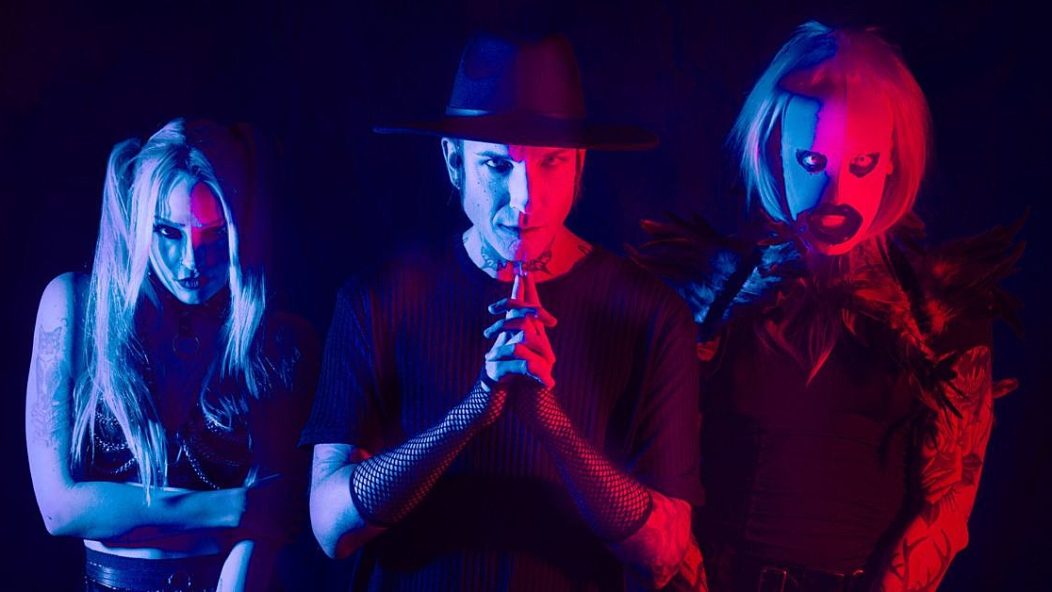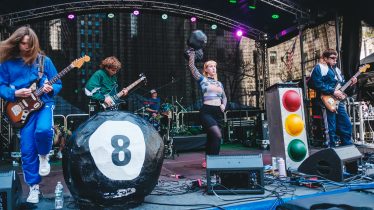
Aesthetic Perfection embraces absurdism and industrial-pop philosophies with MMXXI
For over 22 years, the dark-electro and industrial project Aesthetic Perfection have been on the cutting edge of genre fusion and progressive art, with an uncanny ability to forecast an ever-changing music industry landscape. Fronted by chief songwriter and founder Daniel Graves, Aesthetic Perfection have released eight studio albums and a host of successful singles that incorporate everything from rock and metal to sugar-sweet pop hooks, all under the guise of black-clad nightclub-ready dance bangers. This past June, Graves and co. shared their eighth studio album, MMXXI, a compilation of previously released tracks that were recorded over the span of 12 months during the COVID-19 pandemic. For this release, the group took on the enormous task of writing, recording and releasing a new song consistently every month for their legion of die-hard fans.
While one can imagine releasing music at such a rapid rate would turn arduous, it’s paid off for the entirely independent group. With no label or outside forces dictating their careers or timelines, Aesthetic Perfection have taken matters into their own hands to give fans the best musical experience possible. Aesthetic Perfection have found a way of operating in the modern world that works, with many of their latest tracks (including the surprise hit “S E X”) becoming some of their most successful songs to date.
Read more: I’ve worked almost every music industry job — coat check is my favorite
After a three-year hiatus from performing live, Aesthetic Perfection hit the road harder than ever with their American Psycho headlining tour, with special guests genCAB and Josie Pace. With Aesthetic Perfection being in their most prolific and revitalized period yet, the group are already making plans to release more music in the new year, with no plans to slow down in the slightest.
What was the process like writing and releasing 12 new songs over the course of 12 months, and what were the pros and cons of operating this way?
It was such a massive undertaking from both a business and creative perspective. Personally, I had been seeing the writing on the walls for years that audiences were drifting away from albums, with the culture shifting to an episodic way of consumption. I started shifting away from albums in 2016, and once the pandemic hit, I was afforded this large chunk of time. I was trying to think of a way to utilize the time to make a larger project but retain the spirit of a piecemeal way of releasing music. It was arduous but also excellent, and not only did it give me something to look forward to but also something my audience could look forward to. A lot of artists tend to overthink things and want to make everything they create their magnum opus, but with this format, you don’t have to overthink like that. During the process, I ended up producing some of the most popular songs of my career.
It’s admirable to see how innovative you have managed to be over the course of 22 years. What has always remained constant is your consistency, and even when you try something new, your fans are always on board. Why do you think that is?
Over the course of 22 years, I’ve had ups and downs, of course. When I first started, I didn’t appreciate all the time, effort and energy that is required to make music as well as the business aspects. I was always solely focused on being a creator, and while that’s fun, you are essentially allowing other people to dictate your work and the trajectory of your career. I think it’s really important that artists focus on the business side of things. It was around 2014 when I began to feel the divergence between my intentions and the record label’s intentions. When I told my label at the time that I wanted to do singles, they said, “Oh, that’s not gonna work,” so we parted ways, and I decided to go independent. It was a very trial-by-fire, rewarding, and humbling experience to [go independent].
Another innovative aspect of your career is how genre-fluid you’ve always been as an artist. You seamlessly fused rock, metal, pop and punk into your core dark-electro and industrial sound, even during a time when experimentation wasn’t as accepted.
I feel like when the “scene” began, there was a lot more support for artistic innovation. In the industrial scene, you had bands like Skinny Puppy and Ministry — bands that would really reinvent themselves with every record, and the audiences were always along for the ride. I feel like as time went on, people got a little more complacent with their expectations when it came to allowing artists to explore new territory, but my philosophy has always been to take the spirit of what those [core] artists were doing and apply it to now. I have this whole industrial-pop philosophy on how I can mix these two competing artistic philosophies in a way that makes sense.
Other than musical influences, what other philosophies are you pulling from to create the universe behind Aesthetic Perfection?
I view art from a dadaist/anti-art and absurdist [perspective] because I feel like the world at this time feels so crazy and absurd that we are trying to almost reflect it in a funhouse-mirror kind of way. I am always trying to find the beauty in the things I hate, and I think Aesthetic Perfection has always been about finding the beauty in ugliness. I don’t think a lot of people understand that perfection is just a construct that’s unattainable, but we’re still always fighting and clawing to get that when it doesn’t [even] exist.
It must feel great being back on the road after such a long hiatus for your American Psycho tour. What has the reception been like for your new music, and how has the tour been in general?
With a career that spans 22 years, it’s hard to fit it all into an hour-long set, but I do my best. I realize that I am an entertainer, and my job is to entertain people, and I’m aware that people want to hear the hits, so I really just weed like two or three songs in there and switch them out every night. It feels surreal to be out here because I haven’t [toured] in three years, so I have definitely had to sweep the dust off, but it really is like riding a bike. It’s been really good, and the people seem to have this hunger for connection and live music where I feel that intensity with every show that we do.
You’ve proven that you are more prolific than ever as a songwriter and performer, so what does the future hold for Aesthetic Perfection next year?
Writer’s block just doesn’t exist for me, and I have about 30 new songs that are ready to go that I did within the last six months. Once the tour is over, I am going to take a break for the holidays, and then in January will get right back into it with new music and videos, and just going bigger, better and crazier. We also have a European tour in the spring [of 2023], so it’s going to be a busy year. I’m gonna take this idea of absurdism and crank it to 11 and see what happens next.










